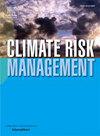The role of social capital in strengthening community resilience against floods: A case study of Mumbai, India
IF 5
2区 环境科学与生态学
Q1 ENVIRONMENTAL SCIENCES
引用次数: 0
Abstract
This study examines the role of social capital in shaping flood resilience within Mumbai’s Sahakar Nagar, a coastal community vulnerable to flooding. Through surveys of 100 residents, we find a positive correlation between trust in community members and the adoption of resilience strategies (r = 0.219, p < 0.05). Trust in neighbors emerges as a key predictor of proactive coping (β = 1.23, p < 0.001), seeking social support (β = 1.32, p < 0.001), and positive reappraisal (β = 1.45, p < 0.001). K-means clustering reveals three distinct community groups (“High Trust Proactive”, “Moderate Trust Networkers”, and “Low Trust Individualists”) exhibiting varying levels of social capital and resilience strategies, reflecting the community’s diverse socioeconomic context, with bimodal income peaks at INR 40,000 and INR 100,000. Social network analysis identifies 12 interconnected sub-communities, highlighting the importance of information hubs within the network. Our findings underscore the critical role of trust in fostering community resilience, suggesting that interventions aimed at building and strengthening trust can enhance flood preparedness and response in urban coastal communities.
社会资本在加强社区抗洪能力中的作用:以印度孟买为例
本研究考察了社会资本在孟买的Sahakar Nagar(一个易受洪水影响的沿海社区)形成抗洪能力方面的作用。通过对100名居民的调查,我们发现对社区成员的信任与弹性策略的采用呈正相关(r = 0.219, p <;0.05)。对邻居的信任是积极应对的关键预测因子(β = 1.23, p <;0.001),寻求社会支持(β = 1.32, p <;0.001),阳性的重新评价(β = 1.45, p <;0.001)。K-means聚类揭示了三个不同的社区群体(“高信任主动者”、“中等信任网络者”和“低信任个人主义者”)表现出不同水平的社会资本和弹性策略,反映了社区多样化的社会经济背景,双峰收入峰值分别为4万卢比和10万卢比。社会网络分析确定了12个相互关联的子社区,突出了网络中信息中心的重要性。我们的研究结果强调了信任在促进社区恢复力方面的关键作用,表明旨在建立和加强信任的干预措施可以提高城市沿海社区的洪水准备和应对能力。
本文章由计算机程序翻译,如有差异,请以英文原文为准。
求助全文
约1分钟内获得全文
求助全文
来源期刊

Climate Risk Management
Earth and Planetary Sciences-Atmospheric Science
CiteScore
8.20
自引率
4.50%
发文量
76
审稿时长
30 weeks
期刊介绍:
Climate Risk Management publishes original scientific contributions, state-of-the-art reviews and reports of practical experience on the use of knowledge and information regarding the consequences of climate variability and climate change in decision and policy making on climate change responses from the near- to long-term.
The concept of climate risk management refers to activities and methods that are used by individuals, organizations, and institutions to facilitate climate-resilient decision-making. Its objective is to promote sustainable development by maximizing the beneficial impacts of climate change responses and minimizing negative impacts across the full spectrum of geographies and sectors that are potentially affected by the changing climate.
 求助内容:
求助内容: 应助结果提醒方式:
应助结果提醒方式:


